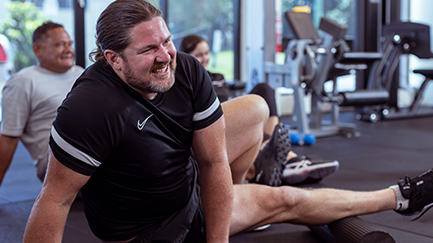
Supporting veterans through service related injuries
The Mates4Mates physical rehabilitation team is here to help veterans improve mobility, manage pain and enhance their overall wellbeing.

It’s estimated that post-traumatic stress disorder effects over 8% of ADF members. June 27 is PTSD Awareness Day - an important time to get to know the signs and symptoms and reach out for help if you’re impacted.
PTSD Awareness Day recognises the effects post-traumatic stress has on the lives of those impacted. At Mates4Mates, we understand the impact that PTSD has on our members and their families and are here to help them through it.
PTSD is a complex mental health condition characterised by a set of symptoms that can develop in a person who has been through a traumatic event which has threatened their life or safety or that of others around them. This could be a vehicle crash, physical or sexual assault, war, or a natural disaster such as the fires that recently impacted Australia. As a result, the person experiences feelings of intense fear, helplessness or horror.
The Australian Defence Force (ADF) estimates that approximately 8.3% of ADF members will have experienced PTSD in the last 12 months, which is significantly higher than in the Australian community (5.2%). ADF males report a greater rate of PTSD compared with the general community (8.1% versus 4.6%). Of interest, in 2018 Beyond Blue released a report on its large-scale study of mental health and wellbeing in police and emergency services. The report found that 10 per cent of employees have probable PTSD.
PTSD not only impacts the individual but the individual’s family and friends. The individual experiencing PTSD may relive the traumatic event through vivid images, unwanted recurring memories or nightmares. In addition, they may experience intense emotional and physical reactions (racing heart, panic, sweating) when reminded of the event. The individual will have a cognitive recollection of the event as well as bodily experience.
An individual with PTSD may present as overly alert or on edge. Irritability, difficulties with concentration, poor sleep are common experiences for a person with PTSD. These symptoms place significant stress on the individual as well as their family and friends. A person with PTSD will actively avoid reminders of the traumatic event. For example, an individual may remove all reminders of their service history including their service medals and uniform. Finally, an individual with PTSD may feel detached from others and emotionally ‘numb’. They may feel isolated and lose interest in activities they once found pleasurable.
If you believe you or a family member has symptoms like those mentioned above, it is important to have a conversation with your General Practitioner. PTSD is a treatable mental health condition in many cases. There are effective treatments available for PTSD including psychiatric medication and psychological interventions, including Cognitive Behaviour Therapy. Treatment will also include pro-longed exposure which has been shown to produce clinically significant improvements in about 80% of patients with chronic PTSD. Eye Movement Desensitization and Reprocessing (EMDR) is another effective treatment for PTSD. Some of the studies of EMDR treatment show that 84%-90% of single-trauma victims no longer have post-traumatic stress disorder after only three 90-minute sessions.
If you would like to know more about PTSD or how you can access support for yourself or a family member, contact your local Mates4Mates Family Recovery Centre. In addition, there are several resources below which provide helpful information about PTSD.
Remember, you don’t have to go through PTSD or mental illnesses alone.
LifeLine: 13 11 14
Open Arms: 1800 011 046
Beyondblue: 1300 22 4636
MensLine Australia: 1300 22 4636
Suicide Call Back Service: 1300 659 467
Kids Helpline: 1800 55 1800
Written by Mates4Mates Psychologist, Christopher McIntyre.

The Mates4Mates physical rehabilitation team is here to help veterans improve mobility, manage pain and enhance their overall wellbeing.